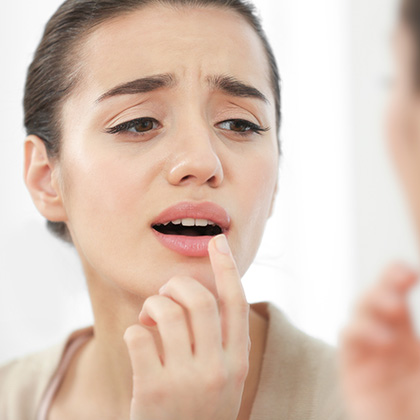
Gum disease is a common issue affecting most adults in the UK, at varying degrees, with most of us experiencing it at least once during our lifetime (i). In fact, according to the National Institute for Health and Care Excellence (NICE), only 17 per cent of adults with their own teeth have completely health gums.
If you have early gum disease (gingivitis) it may go unnoticed as it’s so mild. But, if left untreated, it can get progressively worse, and you may end up with periodontitis, the later stage of gum disease. By that time there’s a real risk of tooth loss. And you wouldn’t be alone, since almost half of adults in the UK have a degree of periodontitis that’s not reversible (ii).
We understand the importance of looking after our teeth and gums is a good way to make sure they stay healthy. A healthy diet, including reduced sugar intake, is a must. Some supplements can help too, including coenzyme Q10 (CoQ10).
What is CoQ10?
CoQ10 is a fat-soluble compound that belongs to the ubiquinone family of compounds. The name ubiquinone comes from the fact that these compounds are ubiquitous – that is, they’re widely found naturally throughout the body in almost all of our cell membranes, with the highest levels in the heart, kidneys, pancreas and liver (iii).
CoQ10 is often described as vitamin-like, but the reason it’s not technically a vitamin is that all humans (and all animals) can make it in their bodies.
Why do we need CoQ10?
You need CoQ10 for many of your organs to work properly and for several chemical reactions in your body. One of its most important functions is to provide your cells with energy, which it does by making another coenzyme called adenosine triphosphate (ATP).
Another of CoQ10’s functions is that it’s an antioxidant that protects your cell membranes from oxidative damage. Oxidative damage happens when you have excessive amounts of substances called free radicals in your body, but antioxidants protect your cells against them. CoQ10 reduces the effects free radicals have on your cell membranes as well as on substances that carry fats through your bloodstream called lipoproteins.

Unfortunately, levels of CoQ10 in your body become lower as you get older. Some experts believe taking cholesterol-lowering medicines called statins can lower your CoQ10 levels too (iv).
Scientists also claim CoQ10 levels are reduced in people with neurodegenerative disorders such as Alzheimer’s disease, cardiovascular diseases, diabetes and even cancer, and that low CoQ10 levels may even play a role in the development of these illnesses (v).
Can you get CoQ10 from food?
CoQ10 can be found in a range of plant and animal-based foods, with meat, poultry and fish providing some of the richest sources. Other foods that contain CoQ10 include:
-
Plant oils (soya, corn, olive and canola)
-
Nuts
-
Seeds
-
Fruit and veg
-
Eggs
-
Dairy foods
An 85g serving of beef, for instance, contains around 2.6mg CoQ10. In comparison, 28g of peanuts contain around 0.8g CoQ10, half a cup of chopped broccoli has 0.5g and a medium-sized boiled egg 0.1g. US scientists have calculated the average dietary intake of CoQ10 is about 3 - 6mg a day (vi). However, this isn’t thought to be enough to increase your CoQ10 levels significantly, which explains why many people who want to boost their CoQ10 levels take a nutritional supplement.
Symptoms of gum disease
Gingivitis gets its name from the word gingivae, which is the medical term for gums (the ‘itis’ part of the word indicates the presence of inflammation – hence swollen gums).
-
Mild gingivitis isn’t always easy to spot, with symptoms including gums that are just a little more red and swollen than normal.
-
Moderate gingivitis causes more noticeable symptoms, including gums that look increasingly red and swollen, as well as gums that bleed a little when you brush your teeth.
-
Severe gingivitis can cause discomfort during tooth brushing, as well as gums that bleed when you brush and when you eat.
What causes gum disease?
Failing to clean your teeth and gums regularly can cause a build-up of dental plaque – a soft, sticky film made from bacteria that forms on the surface of your teeth. If you don’t remove it by brushing your teeth this build-up can become hard, at which point it’s called tartar or calculus. Tartar isn’t easy to remove yourself as it’s firmly attached to your teeth – usually it will have to be professionally removed by a dentist or hygienist.
The bacteria in plaque and tartar release substances that damage your gums, and your immune system responds to this damage by sending more blood to the area, causing inflammation and redness – in other words, the early signs of gum disease.
To make sure you’re not developing gum disease, see your dentists for regular check-ups, as often as they recommend. At home, brushing your teeth and gums twice a day for at least two minutes each time is essential to help prevent gum disease. It’s also important to clean between your teeth every day using dental floss, dental tape or interdental brushes.
Find out more ways of maintaining good oral health by reading our article Gum Disease Causes and Natural Treatments for Gingivitis
How does CoQ10 help your gums?
A study published back in 1974 showed that samples of gum tissue with gingivitis contained low levels of CoQ10 compared with samples of healthy gum tissue (vii). Since then, researchers have looked further into the link between CoQ10 deficiency and gum disease as well as the enzyme’s potential for controlling inflammation. Research shows CoQ10’s inflammation-lowering abilities in a range of conditions, with one review published in the medical journal Healthcare in 2022 stating preclinical and clinical studies have shown CoQ10 has anti-inflammatory effects (viii). An example of these studies is a trial that suggests CoQ10 supplements may lower inflammation in people with coronary heart disease (ix).
Currently, there aren’t that many studies that focus on CoQ10 and how it may help in the treatment of gum disease. However, here are a few examples of what the science says:
-
Scientists writing in the Indian Journal of Pharmacology suggest CoQ10 supplements may help boost levels of the enzyme in gum tissues affected by periodontal disease as well as help suppress gum inflammation (x).
-
Researchers writing in the Journal of Clinical & Diagnostic Research evaluated the effectiveness of taking CoQ10 supplements in addition to conventional treatments for gum disease called scaling and root planing (both are deep cleaning dental procedures that aim to remove plaque and tartar). They followed two groups of people with plaque-induced gum inflammation: both groups had the scaling and root planing treatments, but one group also took CoQ10 supplements while the other took a placebo (dummy pill). At the end of the study, the researchers found both groups showed improvements in their gum health, but those who took the CoQ10 supplements had significantly reduced gum inflammation compared with those who took the placebo (xiii).
-
A study published in the European Journal of General Dentistry also investigated the effect of taking a CoQ10 supplement on gum health. Participants with chronic periodontitis followed a conventional oral hygiene regime, but those who also took CoQ10 supplements had significantly improved gum disease symptoms (xiv).
Is CoQ10 safe to take?
Whether you take CoQ10 to protect or improve your oral health or for one of the many other benefits it may have to offer – including heart health, cognitive health, migraine, skin health, exercise performance and fertility – you may be wondering how safe it is to take on a long-term basis, and whether or not it interacts with any other medicines.
According to experts from the Linus Pauling Institute at Oregon State University in the US, there haven’t been any reports of significant adverse side effects of CoQ10 supplements. Possible mild side effects can include gastrointestinal symptoms such as abdominal discomfort, heartburn, nausea and diarrhoea. However, CoQ10 should be avoided by women who are pregnant or breastfeeding. If you take anticoagulants – prescription medicines that thin your blood such as warfarin – it’s essential to consult your doctor before taking a CoQ10 supplement as it may make anticoagulants less effective, which could increase your risk of having a blood clot.
Need more information?
For more articles, help and advice on keeping your teeth and gums healthy, why not visit the oral health section of our pharmacy health library.
References:
-
Available online: https://www.nhsinform.scot/illnesses-and-conditions/mouth/gum-disease
-
Available online: https://cks.nice.org.uk/topics/gingivitis-periodontitis/references/
-
Available online: https://www.nccih.nih.gov/health/coenzyme-q10
-
Dhanasekaran M, The emerging role of coenzyme Q-10 in aging, neurodegeneration, cardiovascular disease, cancer and diabetes mellitus. Curr Neurovasc Res 2005 Dec;2(5):447-59. Available online: http://www.eurekaselect.com/article/5237
-
Available online: https://lpi.oregonstate.edu/mic/dietary-factors/coenzyme-Q10#sources
-
Nakamura R et al., Study of CoQ10-enzymes in gingiva from patients with periodontal disease and evidence for a deficiency of coenzyme Q10. Proc Natl Acad Sci USA 1974 Apr;71(4):1456-60. Available online: https://www.ncbi.nlm.nih.gov/pmc/articles/PMC388364/
-
Available online: https://www.ncbi.nlm.nih.gov/pmc/articles/PMC388248/pdf/pnas00057-0450.pdf
-
Sifuentes-Franco S et al., Antioxidant and Anti-Inflammatory Effects of Coenzyme Q10 Supplementation on Infectious Diseases. Healthcare (Basel) 2022 Mar;10(3):487. Available online: https://www.ncbi.nlm.nih.gov/pmc/articles/PMC8953254/
-
Lee BJ et al., Effects of coenzyme Q10 supplementation (300 mg/day) on antioxidation and anti-inflammation in coronary artery disease patients during statins therapy: a randomized, placebo-controlled trial. Nutr J 2013 Nov 6;12(1):142. Available online: https://nutritionj.biomedcentral.com/articles/10.1186/1475-2891-12-142
-
Prakash S, Sunitha J, Hans Mayank, Role of coenzyme Q10 as an antioxidant and bioenergizer in periodontal diseases. Indian J Pharmacol 2010 Dec;42(6):334-337. Available online: https://www.ncbi.nlm.nih.gov/pmc/articles/PMC2991687/
-
Hanioka T, et al., Effect of topical application of coenzyme Q10 on adult periodontitis. Mol Aspects Med 1994;15 Suppl:s241-8. Available online: https://www.sciencedirect.com/science/article/abs/pii/0098299794900345?via=ihub
-
Manthena S, et al., Effectiveness of CoQ10 Oral Supplements as an Adjunct to Scaling and Root Planing in Improving Periodontal Health. J Clin Diagn Res 2015 Aug;9(8):ZC26-ZC28. Available online: https://www.ncbi.nlm.nih.gov/pmc/articles/PMC4576635/
-
Saini R., A clinical and microbiological study to evaluate the effect of dietary supplement of coenzyme Q10 in nonsurgical treatment outcome of chronic periodontitis patients after phase 1 periodontal therapy. European J of General Dentistry Sep 2014. Available online: https://www.researchgate.net/publication/307679955
Related Posts
Disclaimer: The information presented by Nature's Best is for informational purposes only. It is based on scientific studies (human, animal, or in vitro), clinical experience, or traditional usage as cited in each article. The results reported may not necessarily occur in all individuals. Self-treatment is not recommended for life-threatening conditions that require medical treatment under a doctor's care. For many of the conditions discussed, treatment with prescription or over the counter medication is also available. Consult your doctor, practitioner, and/or pharmacist for any health problem and before using any supplements or before making any changes in prescribed medications.

Christine
Christine Morgan has been a freelance health and wellbeing journalist for almost 20 years, having written for numerous publications including the Daily Mirror, S Magazine, Top Sante, Healthy, Woman & Home, Zest, Allergy, Healthy Times and Pregnancy & Birth; she has also edited several titles such as Women’ Health, Shine’s Real Health & Beauty and All About Health.
View More



